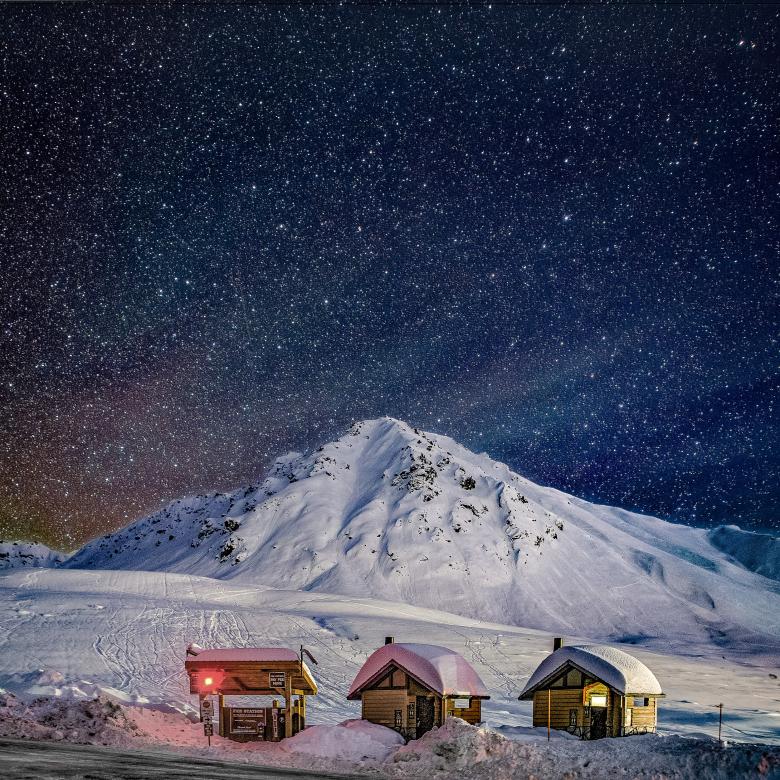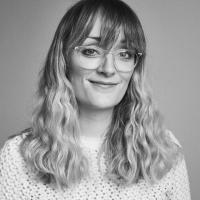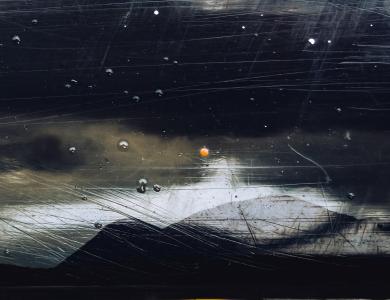Hal Gage's nighttime shot of Hatcher Pass, Alaska, was one of the most popular entries on our WPO’s PIC OF THE WEEK (and why we ❤️ it) series on Instagram, with all of you voting for this to be the winning photograph for October on our Stories. We talk to the photographer to hear more about his striking image.

© Hal Gage, United States, Shortlist, Open competition, Landscape, 2022 Sony World Photography Awards
Your shortlisted photograph is of Hatcher Pass, Alaska. Can you share the story behind this image?
I made this image early on a cold March morning. I was out in search of the Northern Lights and decided to drive about 60 miles north of my hometown. Even in a small city like Anchorage, Alaska (pop. 300,000), light pollution is a problem. Up in the mountains of Hatcher Pass (about 2500 ft) there is a small, rugged ski slope with a few support out-buildings. The skies were deep black and the stars were shining bright. At the time of the exposure, I'm not sure if the slight display of the Northern Lights was visible to the naked eye, but with the camera set to f2.8 and ISO 3200, I made a 30-second exposure and could just make out a wisp of the lights. Knowing that post-processing would bring out what was there, I concentrated on the foreground. The trio of buildings made a nice repetition of shapes. The berm of piled snow and the sliver of road acted as a foundation to help frame the mountain.
My Sony A73 MK IV performed admirably, even at that high ISO. My main concern was the red light on the chalet. As it turned out, a little selective saturation and luminance adjustment in Lightroom took care of it so it wasn't so overwhelming. Noise reduction was accomplished through Topaz Denoise which made an excellent distinction between excessive noise and actual stars. After about an hour of making time exposures of this and other subjects, it was time to get back in the warm car and head out to make more night photographs elsewhere.
You were shortlisted in last year's Landscape category in the Open competition. What advice do you have for photographers thinking about submitting their work to this category?
If at first you don't succeed...I didn't get anything accepted the first time I entered, but since then I have made the shortlist twice and won the Open Landscape category in 2019. This competition is really worth the effort. The prestige and recognition that winning has brought me has been a real shot in the arm for my career. Being judged with your peers from all over the world is a real honour.
As to what to enter, don't try and pander to the judges, just put in your best. Be your most brutal editor. Once you feel you can't cull it down any further, consult friends, family and colleagues. And, finally, make your choices based on the work that you would most like others to see. Choose what makes you proudest of that year's work.
You took up photography because...
I was a frustrated painter!?! Maybe. I have drawn and painted all my life. I even studied it at university. My painting mentor, who was experimenting with photography at the time, turned me on to the possibilities it offered. At first, I was interested as a surrealist in the realism that photography offered. Eventually, I branched out into all sorts of genres of photography.
Who or what has been the greatest influence on your photography?
That's a long list. Exposure to Edward Weston, and Ansel Adams' zone system took me on the path of landscape photography (well suited to my Alaska surroundings). Jay Dusard helped me to find my voice as a printmaker. Emmet Gowin inspired me to reconnect with my roots in the visual arts. Besides the usual suspects like the ones listed above, my late friend and celebrated photographer, Dennis Witmer (1957-2022), was a profoundly influential contemporary. He encouraged my development as a conceptual artist and helped set me on my current course.
What characteristics do you need to become a photographer?
Persistence, tenacity, sensitivity to your surroundings, and patience. Also, a tolerance for self-imposed poverty – just kidding on that last one.
Favourite photographic quote?
I have a few:
'Nothing worse than a sharp photograph of a fuzzy idea.' Ansel Adams.
'I photograph to find out what the world looks like photographed.' Garry Winogrand.
'...if a day goes by without my doing something related to photography, it's as though I've neglected something essential to my existence..., as though I had forgotten to wake up.' Richard Avedon



